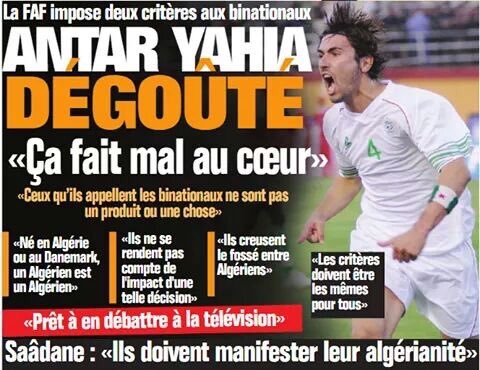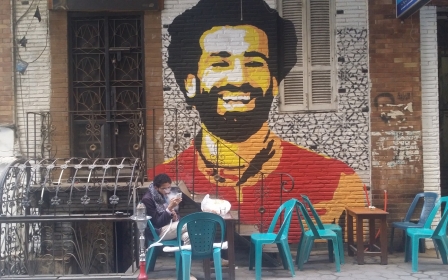Video campaign tackles dual-national 'racism' in Algerian football

ALGIERS – Anti-racism campaigners in Algeria are using social media to raise awareness about what they say is "systematic discrimination" aimed at French-Algerian players representing the country's national football team.
A video shared online last month urges Algerians to sign a petition condemning the Algerian Football Federation which in November last year announced that dual-nationals considered for selection would have to display an "unconditional commitment to Algeria" and be technically superior to players living in Algeria.
"Racism is not an opinion, it's a crime," the young narrator of the video says before calling on viewers to sign the petition, which is addressed to Gianni Infantino, the president of football world governing body FIFA, to "stop the systematic discrimination against Algerian dual nationality players".
"FIFA's position on the issue of racism is unequivocal: racism or any form of discrimination simply have no place in football," says the petition, which is also to be sent to the African Football Confederation, the International Olympic Committee (IOC) and the International Federation for Human Rights (FIDH).
The video includes footage of commentators, pundits and former players singling out French-Algerian players for criticism.
In one clip, a player is signalled out on account of his first name: "If you were a real Algerian, would you call your son Carl?," one sports commentator is heard saying, referring to Carl Medjani, a member of Algeria's squads at the 2010 and 2014 World Cups who had previously captained France at under-21 level.
In another, a television host says of national team goalkeeper Rais M'Bolhi, another star of the country's 2010 and 2014 World Cup campaigns: "I'm more Algerian than M'Bolhi, his father is Congolese."
And in a final clip, Ali Bencheikh, a member of the Algerian team which beat West Germany at the 1982 World Cup, speaks disparagingly of dual-national players, saying: "Don't tell me they are our children, too. I'm not going to buy that!"
Algeria has drawn on dual-national players extensively since 2009 when world football governing body FIFA relaxed its rules on international eligibility to allow players older than 21 who had played for national teams at junior level to switch their registration to another country at senior level.
The video begins with commentary and cheering from Algeria's 1-0 World Cup playoff victory over Egypt in Omdurman in Sudan on 18 November, 2009, the match in which Algeria secured a place at the 2010 World Cup finals for the first time since 1986.
Algeria's goalscorer that day was Antar Yahia, one of the first French-Algerians to join the national team in 2004. Of the 23-man squad that Algeria sent to South Africa in 2010, 18 players were French-born and many of them had risen through the ranks of the French football system and played for French clubs.
The issue of dual nationality has long been a contentious subject in France where the far-right National Front has called for the government to do away with dual nationality status altogether and force dual nationals to choose between France and their countries of origin.
France's World Cup triumph on home soil in 1998 with a multicultural team in which Zinedine Zidane, a Marseille-born French-Algerian, was the star player was widely celebrated, but French football was shaken by a racism scandal in 2011 when French Football Federation officials were secretly recorded discussing capping the number of players from Arab and African backgrounds selected to attend national academies.
But the creators of the video and the petition argue that French-Algerians have also been victims of discrimination in Algerian football, particularly as the national team has become a target for criticism following disappointing eliminations from the 2015 and 2017 African Cup of Nations tournaments and failure to qualify for the 2018 World Cup.
"For the past five years, dual nationality Algerian football players have been the target of a campaign of systematic discrimination," the authors of the petition wrote.
The authors also referred to the Algerian Football Federation's directive last November which said: "Two criteria will be taken into consideration when inviting an Algerian player living abroad to play for one of the national teams: His unconditional commitment to Algeria and his technical superiority to other players living in Algeria."
"It's unthinkable to see the current Algerian Football Federation giving in to shameful practices," the petition said. "The decision was greeted with outrage by everyone across the board, former dual national players and dual nationals on current teams, as well as the large majority of Algerian citizens."
The federation has also faced criticism over its stance from football insiders.
"It really gets to me when I hear people saying that today's players for the national team aren't putting their heart into it," said Rabah Saadane, the former national coach who led Algeria to the 1986 World Cup finals in Mexico.
"It's not true. If it were, they wouldn't have come here in the first place. The fact they agreed to wear Algeria's colours shows they are determined to be worthy representatives of the team."
This story is based on a story originally published on Middle East Eye's French website.
Stay informed with MEE's newsletters
Sign up to get the latest alerts, insights and analysis, starting with Turkey Unpacked
Middle East Eye delivers independent and unrivalled coverage and analysis of the Middle East, North Africa and beyond. To learn more about republishing this content and the associated fees, please fill out this form. More about MEE can be found here.





